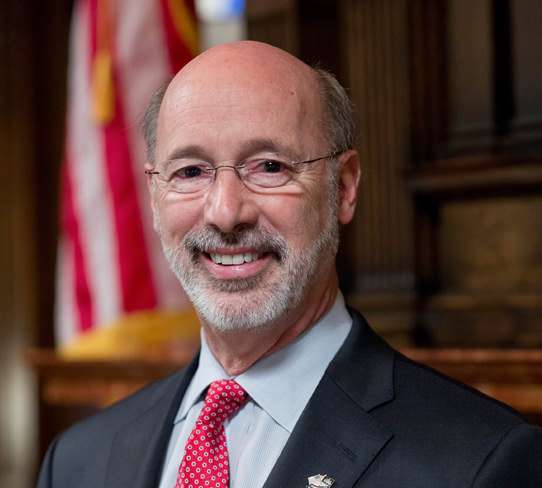Vetoing Liquor Privatization, Pennsylvania's Governor Says Competition Would Raise Prices
Tom Wolf claims a state monopoly benefits consumers.

Yesterday Pennsylvania Gov. Tom Wolf vetoed a bill that would have privatized the sale of wine and liquor while liberalizing the rules for selling beer in the Keystone State. Wolf counterintutively argues that replacing the state monopoly with private businesses would be bad for consumers. "During consideration of this legislation," he says, "it became abundantly clear that this plan would result in higher prices for consumers." He also worries that letting private businesses sell wine and liquor would result in "less selection for consumers."
According to the Pittsburgh Post-Gazette, Wolf and his fellow Democrats "warned that prices would rise as private businesses sought profit." In other words, private merchants will jack up prices because they want to make money—unlike the Pennsylvania Liquor Control Board (PLCB), which seeks only to raise revenue. If you think those two motives sound pretty similar, you are smarter than Pennsylvania's governor, who fails to recognize that the relevant difference between these two models for distributing booze, when it comes to how high prices can be raised, is the presence or absence of competition. Other things being equal, more competition leads to lower prices, so it is hard to see why Pennsylvanians would have to pay more for a bottle of whiskey if the state monopoly were replaced by profit-driven businesses competing against each other.
If you compare the prices charged by the PLCB to the prices charged by, say, Total Wine & More across the border in New Jersey, you'll find that customers generally pay more for liquor in Pennsylvania: for example, just picking three products I often buy, $30 vs. $25 for Bulleit rye whiskey, $52 vs. $44 for 10-year-old Ardbeg Scotch, and $44 vs. $37 for Herradura reposado tequila (all in 750-milliliter bottles). Total Wine also has a bigger selection: 354 varieties of Scotch, for instance, compared to fewer than 100 at the PLCB. Is there any reason to think Total Wine could not offer similar prices and variety to Pennsylvanians?
The prediction of higher prices is not only inconsistent with basic economic principles and the experiences of the three dozen or so states that already have private liquor sales. It is also inconsistent with another major argument used by opponents of privatization, who say abolishing the state monopoly will lead to more drinking and more alcohol abuse. Last year, for instance, the union that represents the employees of Pennsylvania's state-run liquor stores warned that privatization would mean more deaths from drunk driving. Or as one union-sponsored TV spot put it, "it only takes a little bit of greed to kill a child." It is hard to reconcile Wolf's warning about higher prices with the union's prediction of higher consumption.
One point made by opponents of privatization is indisputably true: The current system is good for some people. The Post-Gazette notes that Democrats worry about "the state jobs provided by the liquor stores," while beer wholesalers, currently the only legal source of beer aside from bars and restaurants (including a few restaurants conveniently located in the middle of grocery stores), do not want to lose the legal privileges that line their pockets. Welcoming Wolf's veto, the Malt Beverage Distributors Association said the bill "would have eliminated most of our small, family-owned and operated businesses."
Such concerns are completely understandable but should carry no weight whatsoever. Any rigged market benefits certain interest groups at the expense of consumers and would-be competitors. For anyone outside those privileged groups, that should count as an argument against the system, not a reason to keep it.
The argument that monopolizing the liquor business brings in revenue that would otherwise have to be raised through taxes likewise proves too much, since it could be used to justify state ownership of any industry. As Senate President Pro Tempore Joe Scarnati (R-Jefferson) and Majority Leader Jake Corman (R-Centre) correctly observe, "Pennsylvania should not be in the business of selling liquor"—or any other consumer good. Imagine how much money could be raised if Pennsylvanians had to buy toilet paper from state-owned outlets.
Scarnati and Corman complain that "Gov. Wolf has rejected moving Pennsylvania into the 21st century when it comes to the sale of wine and spirits." That strikes me as excessively generous. The technology enabling private merchants to exchange booze for money is hardly a recent development. It has been around for thousands of years. It's the idea that governments should run this business that is relatively new, and its rationale had nothing to do with keeping prices low, contrary to what Wolf seems to think. Quite the opposite: The state liquor monopolies created after the repeal of Prohibition were designed to be bad for consumers, on the theory that making it harder and more expensive to get drunk would result in less drunkenness.
Through "modernization of our state liquor system," Wolf says, "we can support and bolster consumer convenience without selling an asset and risking higher prices and less selection for consumers. I am open to options for expanding the availability of wine and beer in more locations, including supermarkets. I have also put other compromises on the table, including variable pricing, direct shipment of wine and expanding state store hours." When Wolf talks about "modernizing" state stores to make them more customer-friendly, he is abandoning the goal of discouraging consumption, which was the main justification for putting the state in charge of liquor distribution to begin with. The more they strive to emulate private businesses, the more state liquor monopolies undermine their reason for existing.


Show Comments (190)